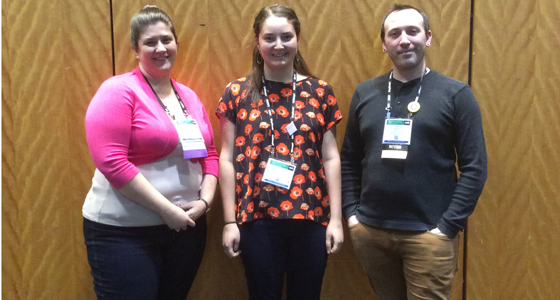Q&A with Deb Sherrer, Pinky Etsell, and Jessica Bergson of the Board Mentor Program.
What were your initial thoughts on your first day of the Conference as a Board mentee?
Jess: It was nice when I got here that I had two people on the Board who knew who I was and were expecting me at the Board meeting the next day. To have people who were responsible for me, not that I needed it, was comforting and nice and it made for a good start to the program.
What do you want to take from the program as well as give?
Pinky: I was part of USITT for many years prior to the Board Mentor Program, so I knew the format of everything. What I wanted from the program was the knowledge of how the organizational structure worked, how the operations worked, how funding tracked through, and how the programming developed.
What I gave back was essentially a different perspective. Most Board members have been out of school for a while and have a different perspective, so it was me lending my naive perspective. The outreach towards the next generation and program development were things we discussed that I felt I could contribute to.
Jess: I learned in school how important a Board is to a nonprofit arts organization. While I believe that, I’d never seen it in practice. I knew that the USITT Board was particularly excellent in terms of their governance and their involvement and commitment to the organization. I wanted to learn about nonprofit Boards through one of the best.
Second, my career is moving away from this world a bit by going into arts marketing. Even though I’m very passionate and excited about that, I want a way to stay connected to the entertainment production side of me.
I wasn’t involved with USITT prior to this opportunity. I wanted to be, but I was always in tech. Many of my friends would come back to school and tell me how amazing USITT was. They were so inspired by it and I wanted to find a way to have a meaningful connection with the organization and find something a little bit deeper.
I haven’t offered much yet, but I will. I have a whole list of thoughts, ideas, and conversations that I want to have over the next year. I hope to give a young, fresh-out-of-school perspective.
What is the most vital aspect of the program?
Pinky: The way that our Board functions, and seeing how that process unfolds at the professional level. We go through a formal agenda and we also work through issues where there is disagreement. Being able to work through that process with 40 people over the course of an eight-hour day is an impressive experience to be part of. It’s amazing how much we get through in that time.
Jess: It’s really about the people. USITT is made up of incredible people across the Institute and they’ve chosen this group of people to represent them on the Board. As a mentee, I get to sit in that room with the Institute’s top representatives and I think that is the most valuable part of the program. At the end of the day, I’ll be able to say I sat on a Board.
Deb: I went up to Kim Scott at the first Board meeting and said, “I want to be you when I grow up.” She said, “Well, let’s have a drink later.” Kim loves mentorship because it’s meeting her future colleagues. That’s what it’s about—it’s a full circle. I think that’s what’s so unique about this opportunity. We’re still here because we’re passionate about being on this committee because we see the full circle of it and everything we give to the mentee they give back ten-fold. It’s about meeting the people you’re going to work with in a new and exciting way.
How would you like to see the program improve?
Pinky: The baseline for me is seeing a diverse candidate pool. We get wonderful people, who are great candidates, but I’d love to see people from different backgrounds.
I’d love to see some lighting designers, maybe some costumers. I’d love to see everyone from all different fields because there are people from those areas who have interest. It’s open to anybody. You don’t have to be an arts major or a production management major. You just have to have an interest in exploring this side of things.
Any final thoughts?
Deb: I think it’s neat that this program is continually evolving. There hasn’t been a year that’s been the same. We truly believe in the idea of a feedback loop. The Institute believes in that and I’m so happy to be involved with an organization that doesn’t believe you need to do something a certain way because that’s the way we’ve always done it.
When I was a mentee, I felt listened to by these really important people who took my advice and changed the program and who now will take Jess’ advice and change the program further. We’re just people. We don’t know everything. What we learn from Jess will be vital and will help shape the next mentee.
Jess: The outgoing mentee in a way becomes a mentor of the incoming mentee by design. I think that’s great because this Institute values mentorship. You’re not only learning how to be a mentee, you’re learning how to be a mentor through this experience and you get to put that into practice with the next person.
